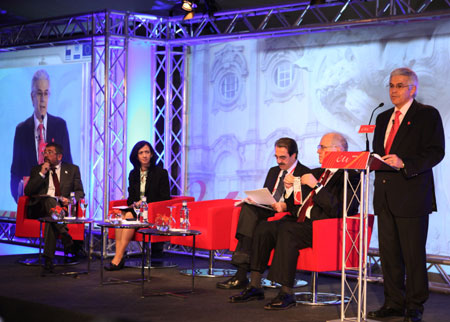Reducing the Digital Gap: the Common Goal of Latin Americans and Europeans
Work area(s)
Government delegations from Latin America, the Caribbean and the European Union agreed to deepen cooperation on key areas to develop the Information Society.

(15 March 2010) Delegates to the V LAC-EU Ministerial Forum on the Information Society agreed in Segovia, Spain, today to strengthen digital strategies to further develop the regulation of the information and communications technologies (ICTs) sector, access and use of the Internet, privacy and reliability of the network, digital contents, e-government and Internet governance.
The two-day forum was organized by the Spanish Presidency of the European Union in collaboration with the European Commission, with the support of the Economic Commission for Latin America and the Caribbean (ECLAC).
In their final statement, participants acknowledged the different degrees of development and challenges of the Information Society in the two regions and called for continuing the progress achieved since the World Summits on the Information Society (WSIS) began.
In Latin America in particular, delegates highlighted the contribution of the @lis Programme (the European Union's Alliance for the Information Society) carried out by ECLAC, which seeks to extend the benefits of the Information Society to every citizen in the region and reduce the digital gap.
At the end of the meeting, the Secretary of State for Telecommunications and for the Information Society in Spain, Francisco Ros, stressed that regulatory models for the ICT sector need to be agile in order to adapt to the dynamics of the Information Society without posing barriers.
The Director of ECLAC's Production, Productivity and Management Division, Mario Cimoli, agreed on the importance of regulation and the role of public administration in Latin America to reduce the enormous domestic gaps in countries in the region with specific policies tailored to each country. "We can't lose the train of the ICTs, and to get on it, access has to be strengthened greatly," he said.
The Forum was attended by representatives from Argentina, Austria, Brazil, Colombia, the European Commission, Costa Rica, Cuba, Germany, the Czech Republic, Denmark, Ecuador, El Salvador, Spain, Hungary, Italy, Malta, Mexico, Portugal, the Netherlands, Slovakia, Slovenia, Sweden, the United Kingdom and Uruguay.
A number of organizations were invited to participate as guests, and included the Ibero American Association of Research Centers and Telecommunications Companies (AHCIET), the Telecommunications Market Commission (CMT), the Organization for Economic Development and Cooperation (OECD), the International Telecommunications Union (UIT), Telecom Italy and Telefónica, among others.
For further information, see the ECLAC webpage.
For press-related requests, contact ECLAC's Information Services. Email: dpisantiago@cepal.org; telephone: (56-2) 210-2149.
Related content
Latin American and European Officials to Discuss Policies for Digital Inclusion and Opportunities for Cooperation
The conclusions of the meeting will be delivered to the Chiefs of State and Government during the LAC-EU Summit to be held in Madrid in May.
Country(ies)
- Latin America and the Caribbean
- European Union
Contact
Public Information Unit
- prensa@cepal.org
- (56 2) 2210 2040